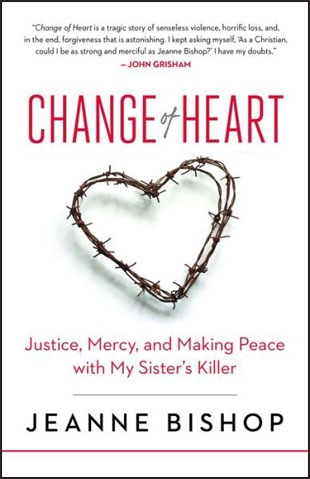Twenty-five years ago, Jeanne Bishop's sister Nancy, her brother-in-law Richard, and their unborn child were shot to death in a crime that shocked the suburban community of Winnetka, Illinois. Bishop writes:
"My first response to that tragedy was to seal a stone over my heart, to take a rock in my hand to throw at the perpetrator, guilty as he was. This is the story of how God rolled away that stone, loosened the fingers that gripped that rock, till it thudded in the dirt--and grew in its stead the green shoots of transformation and new life, renewal and change."
Following her beloved sister's death, the author quit her job at a prestigious law firm where she did corporate work and switched tracks to become a public defender. After the killer was arrested, she learned that his name was David Biro and that he was a junior in a public high school, the same one her sister attended when she was his age. Biro had a long history of violence and breaking the law. He was sentenced to life in prison without the possibility of parole.
In the spirit of her murdered sister who was such a loving person, Bishop resolves to forgive Biro. She encounters some resistance. A woman hearing her speak at a church says, "You must not have loved your sister very much. . . . Because I love my brother, and I would never, ever, forgive anyone who took his life."
Eventually, Bishop meets with Biro and they begin working toward a reconciliation. The author realizes that she is taking baby steps toward restorative justice which, according to Black's Law Dictionary, is "an alternative delinquency sanction that focuses on repairing the harm done, meeting the victim's needs, and holding the offender responsible for his or her actions."
Bishop refuses to write Biro off. She concludes that "God changed my heart? Why not the heart of David Biro?"
